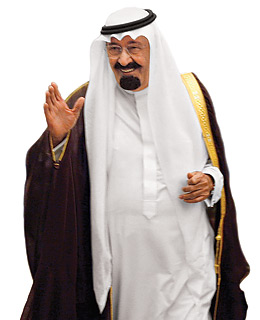
King Abdullah
On weekends King Abdullah bin Abdul Aziz al-Saud likes to retire to his Thoroughbred farm outside Riyadh and perhaps catch a horse race on satellite TV. The rest of the week, the 83-year-old Saudi ruler can scarcely catch his breath. Inside the kingdom, he's been busy crushing an internal revolt by al-Qaeda while trying to open up Saudi Arabia's conservative society. Beyond his country's borders, Abdullah has enhanced Saudi influence in the Middle East. The Custodian of the Two Holy Mosques in Mecca and Medina has worked with Iran to cool down Sunni-Shi'ite tensions in Lebanon while warning the mullahs about the risks of their nuclear ambitions. The King recently presided over an Arab summit in Riyadh that relaunched his most notable diplomatic feat: an Arab peace initiative, based on his Abdullah Plan of 2002, calling for full peace with Israel in exchange for Israel's withdrawal from the occupied territories.
Abdullah's rising diplomatic profile has been welcomed by the Bush Administration, which has pushed the Saudis to help stabilize Iraq and contain Iran. But Abdullah has been insistent on staking his independence from Washington. Abdullah recently stunned the White House with his pronouncement that the U.S. presence in Iraq is an "illegal foreign occupation." In February he mediated the Mecca Accord, which established a Palestinian national-unity government, again against Washington's wishes. "America is a friend," he said in a 2002 TIME interview. "But America cannot be the sole policeman in the world." That view is catching on in America too.